In Nepal’s modern corporate and financial landscape, debentures play a crucial role as a reliable means of raising long-term funds. For many companies, especially large public entities and financial institutions, debentures offer an alternative to issuing shares or seeking bank loans. They help businesses secure capital while providing investors with a stable, interest-bearing investment opportunity.
The Companies Act, 2063 (2006), along with the Securities Act, 2063, and guidelines from the Securities Board of Nepal (SEBON), governs the issuance and management of debentures in Nepal. Understanding the concept, legal framework, and procedures related to debentures is essential for both companies and investors looking to participate in Nepal’s capital market.
What is a Debenture?
A debenture is a type of debt instrument used by companies to borrow money from the public or institutions for a fixed period and at a predetermined interest rate.
It acts as a loan certificate issued by the company to investors, acknowledging that it owes them a specific amount, which will be repaid on a fixed maturity date along with interest.
Debenture holders are creditors, not owners, of the company. This distinguishes them from shareholders, who hold ownership stakes and voting rights.
In return for their investment, debenture holders receive regular interest payments (often semi-annually or annually), and their principal amount is repaid upon maturity.
In simpler terms, when a company issues a debenture, it borrows funds from the public under agreed-upon terms, without diluting ownership control, as would be the case with issuing shares.
Legal Framework Governing Debentures in Nepal
Several key legal provisions and authorities govern the issuance and management of debentures in Nepal:
- Companies Act, 2063 (2006) - Outlines the procedures for issuing debentures, obtaining approvals, and ensuring compliance with company and financial regulations.
- Securities Act, 2063 (2007) - Regulates the public issuance and trading of debentures through the Securities Board of Nepal (SEBON).
- Securities Registration and Issue Regulation, 2073 - Provides detailed procedures for registering and issuing debentures in the market.
- Nepal Rastra Bank (NRB) - Oversees debenture issuances by banks and financial institutions to ensure they align with monetary policies and capital adequacy requirements.
These frameworks collectively ensure that debenture issuance remains transparent, well-regulated, and beneficial to both issuers and investors.
Key Features of Debentures
Some defining characteristics of debentures include:
- Fixed Interest Rate – Debenture holders receive interest at a predetermined rate, usually paid periodically.
- Maturity Period – Debentures are issued for a fixed duration, after which the principal amount is repaid.
- Tax Audit – Focuses on verifying the company’s compliance with tax laws, including income tax calculations and deductions.
- No Ownership Rights – Debenture holders are creditors, not shareholders. They do not have voting rights in the company.
- Transferable Instrument – Most debentures are transferable, allowing investors to sell them on the secondary market before maturity.
- Priority in Repayment – In case of liquidation, debenture holders are repaid before shareholders.
- Security – Some debentures are backed by the company’s assets (secured debentures), while others are unsecured.
Types of Debentures in Nepal
Debentures can be classified based on several factors, including security, convertibility, and duration.
The main types recognised under Nepali corporate and financial practice include:
These are debentures collateralised by the company’s assets. If the company defaults on its repayment obligations, the debenture holders have a legal right to the secured assets.
Secured debentures are considered less risky for investors and are commonly used in Nepal.
Also known as naked or simple debentures, these do not have any collateral backing.
Debenture holders depend solely on the company’s credibility and financial performance.
These carry a higher risk but often provide higher interest rates.
These debentures can be converted into equity shares of the issuing company after a specific period.
Conversion terms are determined at the time of issuance. Convertible debentures are popular among investors seeking both fixed returns and the potential for future ownership.
These debentures cannot be converted into shares. Investors receive fixed interest throughout the tenure and the principal amount upon maturity.
Non-convertible debentures are commonly held by institutional investors in Nepal.
Issued for a specific period, these debentures are repaid or redeemed at maturity, along with the interest.
Most corporate debentures in Nepal fall under this category.
These are rare in Nepal. The company is not bound to repay the principal within a fixed period, and investors continue to receive interest indefinitely unless the company is liquidated.
- Registered Debentures – The names of holders are recorded in the company’s register, and transfer requires notification to the company.
- Bearer Debentures – These are transferable by delivery, and whoever possesses them is considered the owner.

Legal Provisions for Issuing Debentures in Nepal
Under the Companies Act, 2063, specific procedures and requirements must be followed before a company can issue debentures:
Approval from the Board of Directors
The company’s Board of Directors (BOD) must first approve the issuance of debentures.
The decision includes determining the amount, interest rate, maturity period, and type of debenture.
Shareholder Approval
Following board approval, a special resolution must be passed by the General Meeting (GM) of shareholders, authorising the company to issue debentures.
Registration with SEBON
If the debenture is to be issued publicly, the company must obtain approval from the Securities Board of Nepal (SEBON).
The company must submit a prospectus that contains detailed information about the issue, including financial performance, risk factors, and repayment terms.
Appointment of a Trustee
Every public debenture issue requires the appointment of a debenture trustee, usually a bank or financial institution, who safeguards the interests of debenture holders and ensures compliance with the debenture agreement.
Creation of Security (for Secured Debentures)
If the debenture is secured, the company must legally mortgage or charge assets to the trustee to protect investors’ interests.
Listing on the Stock Exchange
Publicly issued debentures must be listed on the Nepal Stock Exchange (NEPSE) for trading, allowing investors to buy or sell them in the secondary market.
Compliance with Disclosure Requirements
The company must regularly report to SEBON and the Office of the Company Registrar (OCR), providing updates on the repayment status, financial position, and interest payments.
Interest Rate and Redemption of Debentures
The interest rate on debentures in Nepal is usually fixed and specified in the issuance document. It may range from 8% to 12%, depending on the issuer’s creditworthiness and market conditions.
Redemption (repayment) occurs either at the end of the maturity period or in instalments, as specified in the debenture agreement. Redemption can be:
- At Par (equal to the face value),
- At Premium (above face value), or
- At Discount (below face value, rarely practised).
Companies must establish a Debenture Redemption Reserve (DRR) in accordance with SEBON guidelines to ensure sufficient funds are available for repayment when the debentures mature.
Rights and Protections for Debenture Holders
Debenture holders enjoy several legal protections under Nepalese law:
- Right to Timely Interest – They are entitled to receive interest payments on schedule, as per the terms of the debenture certificate.
- Right to Principal Repayment – The issuing company must repay the principal amount on or before the maturity date.
- Right to Legal Recourse – In case of default, debenture holders can approach the debenture trustee or take legal action against the company.
- No Ownership Rights – Debenture holders are creditors, not shareholders. They do not have voting rights in the company.
- Priority in Liquidation – Debenture holders have priority over shareholders in receiving payment from the company’s assets during liquidation.
- Transfer Rights – They can sell or transfer their debentures as per the company’s articles or stock exchange rules.
Advantages of Debentures
- No Ownership Dilution – Companies can raise funds without giving up control or equity.
- Tax Benefits – Interest paid on debentures is a deductible expense for tax purposes.
- Long-Term Financing – Debentures help raise large sums for long-term projects or expansion.
- Stable Cost of Capital – Fixed interest rates make financial planning predictable.
- Fixed Income – Debenture holders enjoy regular interest income.
- Lower Risk – Secured debentures provide safety through collateral backing.
- Liquidity – Listed debentures can be traded on NEPSE before maturity.
- Priority in Repayment – Debenture holders are repaid before shareholders in case of liquidation.
Disadvantages of Debentures
Here are the disadvantages of debentures for companies and investors:
For Companies
- Fixed Obligation – Companies must pay interest regardless of profit, increasing financial pressure during downturns.
- Asset Encumbrance – Secured debentures require mortgaging assets, limiting future borrowing flexibility.
For Investors
- Limited Returns – Investors receive fixed interest even if the company performs well.
- Default Risk – Unsecured debenture holders may face loss if the company defaults.
Conclusion
Debentures have become a vital instrument in Nepal’s financial and corporate ecosystem, serving as a bridge between investors seeking secure returns and companies requiring long-term capital.
Governed by the Companies Act 2063 and regulated by SEBON, they promote transparency, investor protection, and financial discipline.
For companies, debentures provide a non-dilutive, cost-effective financing option, while for investors, they offer a stable, predictable income stream.
As Nepal’s capital market continues to mature, the proper use and regulation of debentures will play a key role in supporting sustainable business growth and strengthening the country’s financial infrastructure.





